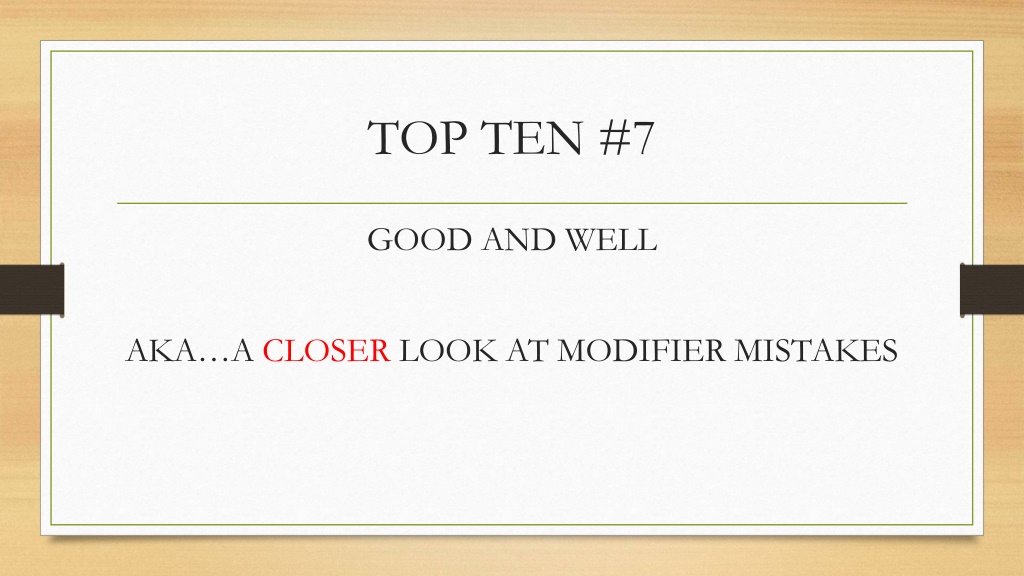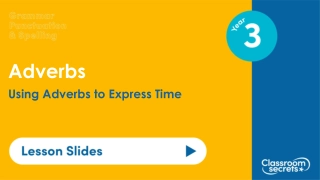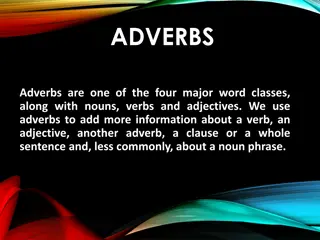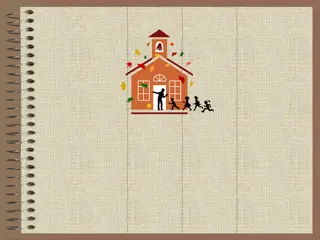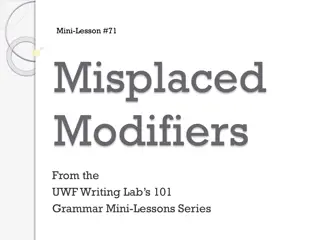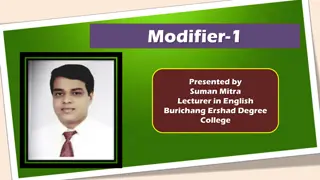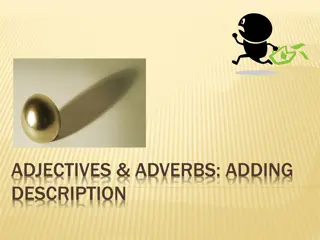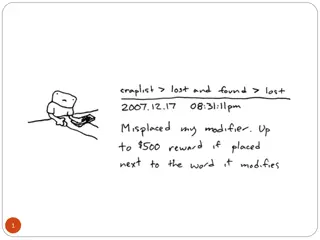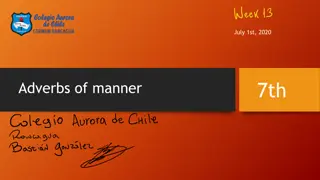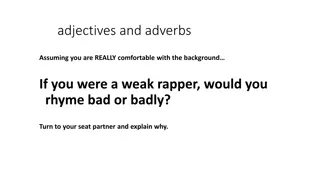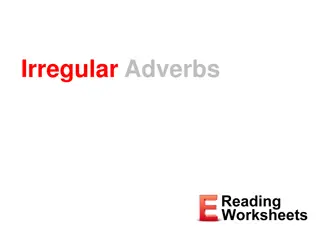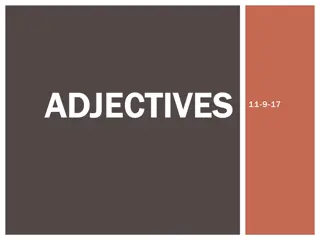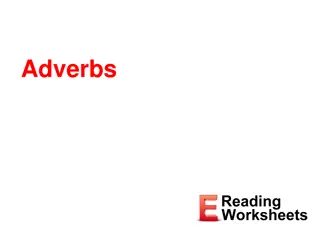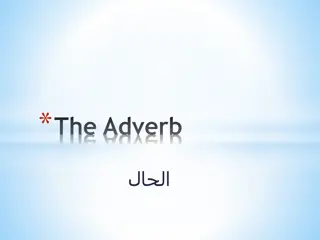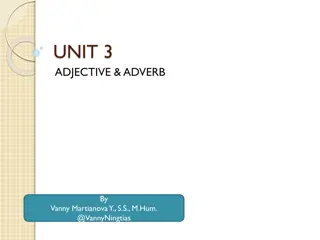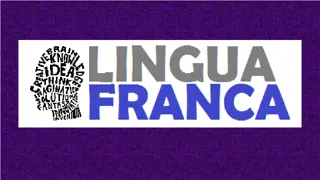Understanding Adjectives and Adverbs as Modifiers in English
Explore the role of adjectives and adverbs as modifiers in English language. Learn how adjectives describe nouns and pronouns, while adverbs modify adjectives, verbs, or other adverbs to show how, where, when, or to what degree an action is done. Understand the difference between adjectives and adverbs through examples and explanations.
Download Presentation

Please find below an Image/Link to download the presentation.
The content on the website is provided AS IS for your information and personal use only. It may not be sold, licensed, or shared on other websites without obtaining consent from the author. Download presentation by click this link. If you encounter any issues during the download, it is possible that the publisher has removed the file from their server.
E N D
Presentation Transcript
TOP TEN #7 GOOD AND WELL AKA A CLOSER LOOK AT MODIFIER MISTAKES
#7-the background First, what does the term modify mean in an English class? How do adjectives and adverbs then serve as the modifiers? In other words, what do they modify? Can you list/explain the ways that the each modify? Hint: There are four answers each. Do you recognize the suffixes used to create each?
adjectives ADJECTIVES: A WORD THAT DESCRIBES A NOUN (or PRONOUN) Show how many Five boys played soccer yesterday. A pencil rolled onto the floor. Show how much There was little rain. The plentiful variety of colors made the picture beautiful. Show what kind Old and Slow computers really frustrate me. The friendly student brought tasty candy for everyone. Show which one That dog is the cutest one ever. This math problem was very easy.
adverbs ADVERBS A WORD THAT DESCRIBES ADJ S, VERBS, OR OTHER ADV S Show HOW a verb was done (in one word) Bill swims quickly to the finish line. (adverb modifying the verb, telling how he swims) He thought intellectually about the problem. (adverb modifying the verb, telling how he thinks) Show WHERE a verb was done (in one word) He tripped and fell down. (adverb modifying the verb, telling where he fell) He went outside. (adverb modifying the verb, telling where he went) Show WHEN a verb was done (in one word) I failed the test yesterday. (adverb modifying the verb, telling when I failed) Earlier, Joe ate breakfast. (adverb modifying the verb, telling when Joe ate)
adverbs ADVERBS A WORD THAT DESCRIBES ADJ S, VERBS, OR OTHER ADV S Show to what DEGREE (how much or little) of an adjective or adverb; these are called intensifiers. The student is so smart. (adverb modifying the adjective, telling to what degree he is smart) The sneeze exploded very loudly. (adverb modifying the adverb, telling to what degree he is loudly sneezing)
adjectives and adverbs Assuming you are REALLY comfortable with the background If you were a weak rapper, would you rhyme bad or badly? Turn to a tablemate and explain why.
adjectives and adverbs Assuming you are REALLY comfortable with the background The anchor of the track team runs quick / quickly. The rose is wonderful / wonderfully. The rose smells wonderful / wonderfully.
#7 packet key (p. 21) A. 1. 2. 3. 4. 5. 6. 7. 8. 9. 10. Wistfully (looked) B. 1. 2. 3. 4. 5. 6. 7. 8. 9. 10. Nervously (paced) 11. Lazily (stretched) 12. Carefully (checked) 13. Wonderful (dinner) 14. Loudly (laughed) 15. Terribly (upset) Tenaciously (clung) Soothing (ice cream) Beautifully (sang) Really (early) Thoughtful (person) Vigorously (does) Steadily (dripped) Awfully (dangerous) Suddenly (stopped) Suspicious (story) Quickly (produces) Obvious (it) Easily (opened) Hilarious (Joellen) Accurate (description) Steadily (poured) Bitter (water) Bad (Larry)
#7 packet key (p. 24) A. 1. 2. 3. 4. 5. 6. 7. 8. B. 1. 2. 3. 4. 5. Adj (how many competitors) Gently Adj (what kind of case) Quickly Adv (how it disappeared) Thoughtful Adv (when we left) Easily Adj (what kind) Bad Adj (which tree) Adv (where do they practice) Adv (to what degree is he shy)
adjectives and adverbs This is essentially good and well. When describing HOW an action is done, use the adverb. He swims well. He knows only too well who the murderer is. When using a linking verb (because there is no action) to describe WHAT KIND of a noun, choose the adjective. After a bath, a baby smells good. That cake tastes good.
TOP TEN #6 THE OTHER MODIFIER Preposition(al phrases)
Prepositions the other modifier PREPOSITION: a word (or group of words) that starts a phrase used to show relationship between its object and the word it modifies; the phrase begins with a preposition and ends with a noun/pronoun called the object of the preposition. [note: words that modify that object are also part of the phrase] Basically the phrase modifies much like an adjective or adverb.
Prepositions the other modifier After lunch, the smart girl near the window luckily remembered to finish her difficult math test. During the game, the angry fans shouted loudly at the poor officiating. The kind, sweet girl with the pig tails sat there in the back and gave help to that young boy.
Prepositions the other modifier 1. Across the street 2. Over the trees and houses 3. Into the room 4. For Best Picture 5. At the photos and paintings 6. In the blue paper 7. In burrows, under piles, of brush 8. Inside the yellow envelope 9. With a glass, of water 10. With the ballerina and her husband 11. Under the couch 12. During the halftime show 13. In my whole life 14. By hook, by crook
Prepositions the other modifier 1. (name) Of the country - ADJ 2. (one) Of my fav songs ADJ 3. In the cave (painted) ADV 4. Along the path (planted) ADV 5. In the dark (see) ADV 6. Over the fence (flew) ADV 7. In the distance (mtn) ADJ 8. (song) from 1954 -ADJ 9. (one) of the hockey players ADJ 10. (shouted) with enthusiasm ADV 11. (leave) at 8:30 AM ADV 12. (a career) in sci research ADJ 13. (dropped) through the net ADV 14. (contacted) by telephone ADV 15. During the storm (stopped) ADV 16. (girl) in the red dress -ADJ
Prepositions now for the mistakes* PREPOSITION: a word (or group of words) that starts a phrase used to show relationship between its object and the word it modifies; the phrase begins with a preposition and ends with a noun/pronoun called the object of the preposition. [note: words that modify that object are also part of the phrase]
Prepositions now for the mistakes* She waited for me on the bus stop. She blurted, I ll wait at 5:00 but not one minute longer. With the foot broken, Billy let out a loud laugh directed at Joe. I approached the waiting ball and struck it into the back of the net. Out of nowhere the goalie lunged and grazed just enough of the ball to deny me, and us, of the victory. She sent a picture in the email to my mom of the costume.
Prepositions now for the mistakes* Where s my coat at? Which movie are you going to? I am the one you gave the gift to.
Prepositions now for the mistakes* I went over my friend s house for dinner. When I am done my work, may I go to the bathroom? We went down the shore over the weekend.
Prepositions the other modifier 1. (With long ears and an orange wig) the child laughed at the clown. 2. We took photographs of the sea (on the pier). 3. Sandy told jokes to the class (about horses). 4. The rancher guided the horse (with a firm hand). 5. Susan included the picture in her letter to her mother (of the newborn calf).
Prepositions the other modifier 6. Carlos left his books on the bus (in his hurry). 7. Alice told us about the great vacation she had (at lunch). 8. The beautiful bride joined hands with the handsome groom (in her lovely dress). 9. The yogurt is for dessert (in the refrigerator). 10.A cat appeared at our door (with long white fur).
